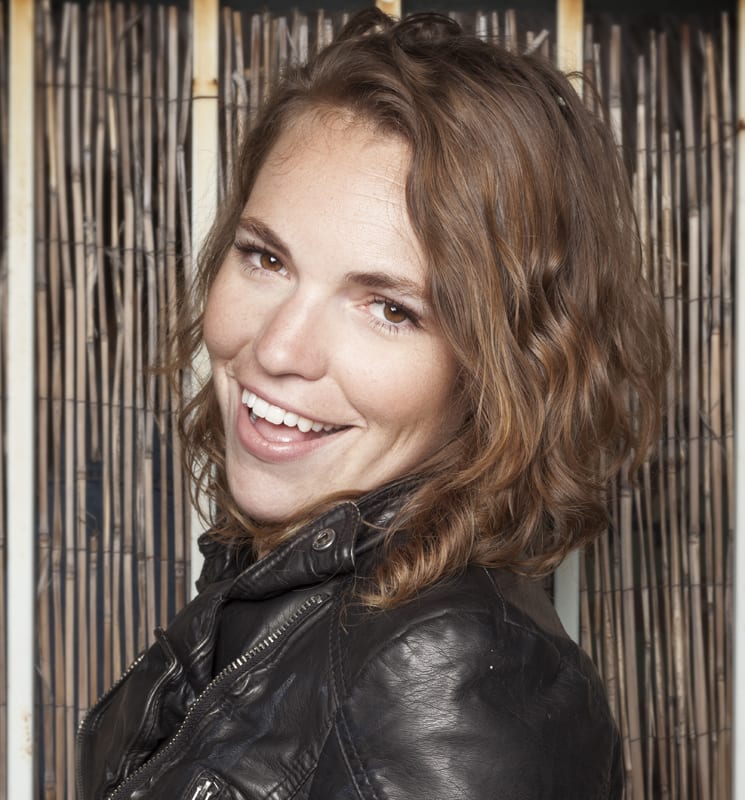This whole show was solidly fantastic. Beth Stelling was as well-versed in finding funniness in everyday life as she was at creating hilarity based on its tragedies, and her openers were both as smart as they were funny.
DeAnne Smith began the show by putting a light-hearted spin on negative things in her life, such as the depressing notes she wrote last year and her parents' subtle racism. Additionally, she discussed her arm tattoo that says "I don't approve" in her grandmother's handwriting, her dad's dirty sense of humour, and what it's like to date a woman who has only dated men in the past. Her writing was witty, and her delivery was sharply calculated yet enthusiastic and relatable.
Jess Salomon followed Smith's performance with an equally enjoyable set based around the relations between different cultures. Less extroverted than Smith but just as cheerful and engaging, Salomon talked about being biracial and Jewish but not looking like she belonged to either of those, and did some progressive jokes about the politics of wearing niqabs. She also hilariously recounted a childhood memory in which her parents explained the Holocaust and told her she was Jewish in the same conversation, and told an anecdote about finding out that her Palestinian girlfriend, who is now her wife, had an anti-Israel tattoo.
Beth Stelling eased into her hour by making fun of American comics who assume Canadians won't get any of their references, then shared a stellar series of observations about her offbeat family. Stelling's description of her ugly, disgusting, slow stepfather was vividly comical, as was her anecdote about how she and her sisters used to mess with him in their adolescence. However, the best part of her family-related material was her anecdote about her mother being unable to answer her cell phone company's security question: "Who was your childhood best friend?" The way she described her mother's simultaneous cluelessness and persistence to find out what the answer was delivered several big laughs.
Stelling also crafted brilliantly bold hilarity about some of the misfortune she's endured. She cleverly turned her mother's hysterectomy into fodder for a one-liner, which likened the procedure to destroying her childhood home, then launched into a very honest yet funny chunk of material about the abusive relationship that she recently escaped. Stelling's ability to excavate comedy from her history of being sexually assaulted was stunning: watching her address the taboo nature of rape and transform her trauma into nuanced, superb comedy was masterful and borderline magical.
DeAnne Smith began the show by putting a light-hearted spin on negative things in her life, such as the depressing notes she wrote last year and her parents' subtle racism. Additionally, she discussed her arm tattoo that says "I don't approve" in her grandmother's handwriting, her dad's dirty sense of humour, and what it's like to date a woman who has only dated men in the past. Her writing was witty, and her delivery was sharply calculated yet enthusiastic and relatable.
Jess Salomon followed Smith's performance with an equally enjoyable set based around the relations between different cultures. Less extroverted than Smith but just as cheerful and engaging, Salomon talked about being biracial and Jewish but not looking like she belonged to either of those, and did some progressive jokes about the politics of wearing niqabs. She also hilariously recounted a childhood memory in which her parents explained the Holocaust and told her she was Jewish in the same conversation, and told an anecdote about finding out that her Palestinian girlfriend, who is now her wife, had an anti-Israel tattoo.
Beth Stelling eased into her hour by making fun of American comics who assume Canadians won't get any of their references, then shared a stellar series of observations about her offbeat family. Stelling's description of her ugly, disgusting, slow stepfather was vividly comical, as was her anecdote about how she and her sisters used to mess with him in their adolescence. However, the best part of her family-related material was her anecdote about her mother being unable to answer her cell phone company's security question: "Who was your childhood best friend?" The way she described her mother's simultaneous cluelessness and persistence to find out what the answer was delivered several big laughs.
Stelling also crafted brilliantly bold hilarity about some of the misfortune she's endured. She cleverly turned her mother's hysterectomy into fodder for a one-liner, which likened the procedure to destroying her childhood home, then launched into a very honest yet funny chunk of material about the abusive relationship that she recently escaped. Stelling's ability to excavate comedy from her history of being sexually assaulted was stunning: watching her address the taboo nature of rape and transform her trauma into nuanced, superb comedy was masterful and borderline magical.
